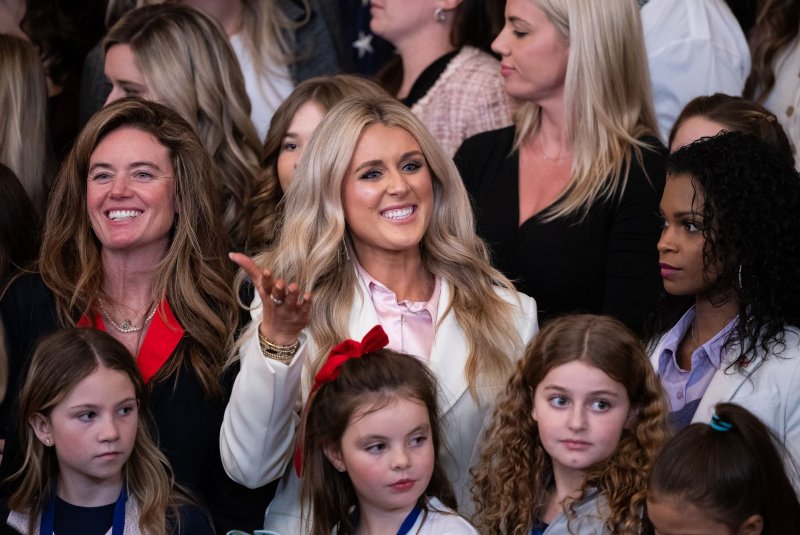Former collegiate swimmer Riley Gaines (C) stands with other advocates while President Donald Trump on Wednesday signs an executive order banning transgender women from women’s sports, which prompted the NCAA from revising its rules to impose a similar ban. Photo by Francis Chung/UPI |
License PhotoFeb. 6 (UPI) — The NCAA’s board of governors on Thursday updated the association’s sports participation policies to restrict biological males from competing in women’s sports.
“The new policy limits competition in women’s sports to student-athletes assigned female at birth only,” the NCAA announced in a news release.
“The policy permits student-athletes assigned male at birth to practice with women’s teams and receive benefits, such as medical care, while practicing,” the NCAA news release says.
The policy is effective immediately and applies to all student-athletes regardless of previous eligibility reviews under the NCAA’s prior transgender participation policy.
The NCAA has 1,100 member colleges and universities in all 50 states and enroll a total of more than 530,000 student athletes.
“We strongly believe that clear, consistent, and uniform eligibility standards would best serve today’s student-athletes instead of a patchwork of conflicting state laws and court decisions. To that end, President [Donald] Trump’s order provides a clear, national standard,” NCAA President Charlie Baker said.
Trump on Wednesday signed an executive order banning transgender women from competing in women’s sports.
Trump referred to the decree as the “No Men in Women’s Sports Executive Order.”
The executive order followed a recent federal court ruling that found former Education Secretary Miguel Cordona and the Department of Education unlawfully imposed a new Title IX rule to define “sex discrimination” and “sexual harassment” to include gender identity.
U.S. District of Eastern Kentucky Judge Danny Reeves said the rule change violated Title IX by altering its definition of “sex” to include gender identity.
Title IX traditionally has supported the biological distinctions between male and female and the creation of men- and women-only sports and facilities, including dorms, rest rooms and locker rooms, based on those biological distinctions, Reeves said.
Although the NCAA has banned gender identity as cause for those born male to compete in women’s sports, it did not ban gender identity as cause for those born female to compete in men’s sports.
The NCAA also does not ban women who are undergoing hormone therapy from practicing with women’s teams and receiving all other benefits that apply to student-athletes, but it does ban them from competing on women’s teams.
